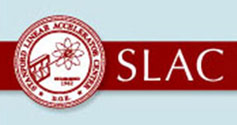

Wednesday - July 9, 2008
SLAC Today is
available online at:
http://today.slac.stanford.edu
In this issue:
A New Name for SLAC
People Today: Lauren Barbieri Assesses Life
Policy Change for SLAC Cell Phones
Conservation Tip of the Week: Heat Waves
 |
 |
|
Wednesday - July 9, 2008 |
 A New Name for SLACThe U.S. Department of Energy (DOE) has asked the Stanford Linear Accelerator Center to work with them in renaming SLAC. Director Persis Drell has been informing employees of the coming change during her recent meetings with laboratory work groups. Discussing the proposed name change, Persis said, “SLAC has a long, illustrious history and the name evokes that history. However, our stakeholders have suggested that the name is also no longer fully representative of the laboratory with its increased involvement in photon science and particle astrophysics in addition to our particle physics program.” She emphasizes that changing the name of the laboratory in no way diminishes the historical achievements of which the SLAC community is proud. Rather, she says, this as an opportunity to create a new name that better reflects the broader laboratory SLAC is evolving into. SLAC is not the first national laboratory to change its name. Fermi National Accelerator Laboratory, Thomas Jefferson National Accelerator Facility and Lawrence Berkeley National Laboratory were all born under different names. Despite name changes, those laboratories have successfully established a continuity of excellence and reputation. Read more... |
||
|
|
||

Lauren Barbieri
|
Policy Change for SLAC Cell PhonesBeginning in late July, SLAC will begin converting to a new policy for provision of services to employees with a business need for cell phone access. There are several drivers for the new policy. A primary driver is to reduce the cost of administering the cell phone accounts held by SLAC, in order to increase funding available for mission and mission-support activities. Another major goal is to ensure that a fair and equitable policy is implemented lab-wide. Currently, the criteria for having cell phone support from the lab vary widely across directorates and departments. Read more... Conservation Tip: Heat WavesIt is so darned hot this week! Here are three very simple tips that can help you save energy and reduce water use during the heat wave. And these quick fixes take little to no time at all—so you won’t get too heated up implementing them. Give them a try, if you haven't already, and stay cool. In the shower—Why heat water up just to cool it down? If you have to mix hot water with cold, your thermostat could be set lower to save energy. Simply adjust the thermostat in your water heater to your perfect shower temperature. In the washing machine—Using cold water instead of warm cuts energy use by 90 percent! In fact, using cold water is often better for your clothes. Use eco-friendly detergents such as Seventh Generation. In the bottle—Buy a water filter and drink water from the tap in a reusable bottle—40 percent of all retail bottled water comes from the tap anyway. Try to avoid buying plastic bottles. The average American drinks 22.6 gallons of bottled water per year. Producing the plastic for all those bottles releases more than four pounds of carbon dioxide per person and consumes a surprising amount of petroleum (0.005 barrels, or nearly a quart of oil per person—yikes!) That’s not to mention the impact to our landfills and ocean waters. Laken—producer of the “world’s finest bottles”—makes a nice drink-safe, lined, aluminum, reusable water bottle that is recommended by the US National Park Service. |
Events
Access (see all)
Announcements
|
| | ||
|
|
||
 <%
Response.AddHeader "Last-modified", getArticleDate()
'Response.AddHeader "Last-modified","Mon, 01 Sep 1997 01:03:33 GMT"
'Monday, December 06, 2010
%>
<%
Response.AddHeader "Last-modified", getArticleDate()
'Response.AddHeader "Last-modified","Mon, 01 Sep 1997 01:03:33 GMT"
'Monday, December 06, 2010
%>View online at http://today.slac.stanford.edu/. |
||